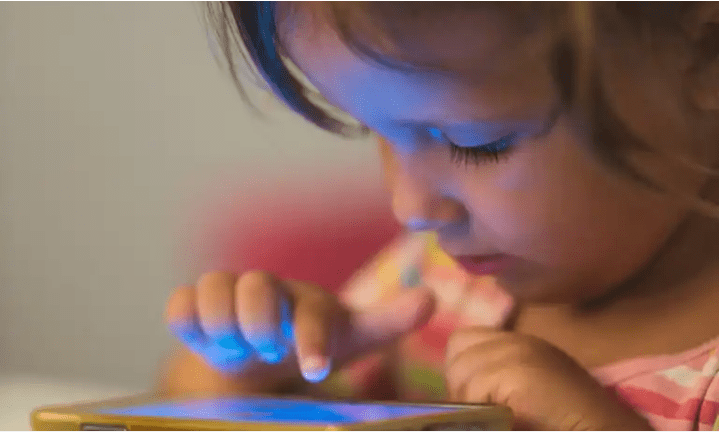When parents give their children cell phones or tablets just to keep them entertained and not to bother them, they may be putting their children’s psychological health at risk.

Today’s children are true digital natives. We could say that they learn to use a cell phone before they learn to communicate, read or ride a bike. While this may seem like an advantage, in reality this is not the case. Because as science has been telling us for a long time, excessive screen use has a negative impact on our little ones.
Today, we see an increasing number of children with problems such as sleep disorders, eating disorders (ED), myopia and even musculoskeletal problems. In addition, mood disorders such as depression and anxiety have been on the rise in this part of the population in recent years.
It is becoming more and more evident that there is something we are doing wrong as parents and educators. Because new technologies are not a danger in themselves. On the contrary, they are allies in the creation of knowledge and learning and in staying connected. The challenge lies in the way we misuse them.
Educating children on the proper use of cell phones, tablets and computers is part of their psychosocial development. Moreover, during childhood and adolescence we should start to perceive screens as ‘junk food’. In other words, something they should only consume occasionally.
Screen overuse: impact on development and mental health
There are many families who properly train their children in the use of new technology. They not only give their children guidelines, but also limit them and give them advice. They also know how to set an example. However, in recent years, some parents have been observed using their cell phones or tablets as a source of entertainment for their children.
In fact, it is an easy mechanism to keep children still and quiet for several hours. Parents allow them to use them while they eat. Almost without even realizing it, these parents are replacing communication and interaction with their children with cold and stimulating screens that begin to shape their children’s brains from an early age.
Research conducted by the University of Calgary (Canada) warned that many children today arrive at kindergarten with various delays in developmental milestones. They indicate a weaker vocabulary and show immaturity in motor skills such as fine motor skills (manipulating objects).
In addition to the developmental domain, it is also important to consider the psychological aspects of excessive screen use.
Childhood depression, anxiety and hyperactivity
Screens have great power to stimulate a child’s brain. Weakening of language or attention problems, as well as mood changes, are seen very early on. Moreover, a child who is entertained by his father’s cell phone or tablet at the age of two will not know any other way to spend his free time when he is five, seven or even nine.
Seven-year-olds show mood disorders associated with new technologies through dependence on screens, sleep disturbances, poor communication and lack of connection with peers. These are all triggers for depression.
They are children who sleep, do not communicate well and are addicted to cell phones, tablets and computers. This phenomenon is further intensified by the use of social media during adolescence. That’s when young people start to compare themselves and suffer from low self-esteem and body acceptance issues.

Excessive screen use and disconnection from the child’s social environment
The overuse of screens changes the child’s reality. They are in a situation where everything is extremely fast and the colors are vibrant, stimulating and fun. A world where they are always in control, without even needing to move. They only need to click, open tabs and scroll.
In that universe, they can talk to people without even leaving the house. They also have all the information in the world at their fingertips. The kind they should never think of as small. In fact, a study conducted by the University of New Hampshire (USA) claims that children are often confronted with pornographic images being sent to them, even if they don’t search for them.
This excessive use of digital devices, added to a lack of parental supervision, is not only hindering their cognitive and maturational development. In fact, we are giving the world boys and girls who feel sadder than ever and disconnected from their social environment. In many cases, they think the real world is too complex, chaotic and in many cases even threatening. We are not saying it is boring.
It is clear why mental health problems are on the rise among the child and adolescent population.
How to regulate the use of electronic devices?
Tablets and cell phones are not toys. They are communication, work and entertainment tools for adults. Unfortunately, there seems to be very little nowadays that causes as much panic in parents as a bored and lazy child. They are almost immediately offered their mother’s cell phone so they can play some games.
We have forgotten how necessary it is for a child to be bored and frustrated. Indeed, that is when their imagination, symbolic and creative thinking is activated. It is also useful for their need to play with other children, to move and develop their communication, mobility, cognitive and emotional skills.
Read other tips that may be useful.
Exposure times and use of displays
The World Health Organization recommends specific guidelines. Children between the ages of two and four should have no more than one hour of screen time per day. They should not be exposed before the age of two.
- Electronic devices should not be used during meals. They should also be turned off two hours before bedtime.
- Between the ages of seven and twelve, they should only be exposed for one hour when accompanied by an adult.
- Between 12 and 15 years old, one and a half hours with adult supervision is recommended if social media is used.
- Between 16 and 18, two hours a day is recommended, avoiding cell phone use at night.
It is clear that these recommendations are rarely followed. Especially when we take into account that the average age at which a child gets their first cell phone is eleven years old. However, we reiterate that the technology itself is not the problem.
It is its misuse that we are concerned about. This is where our responsibility as adults comes into play. Indeed, knowing how to educate and set an example means we are taking care of our children’s future mental health.




